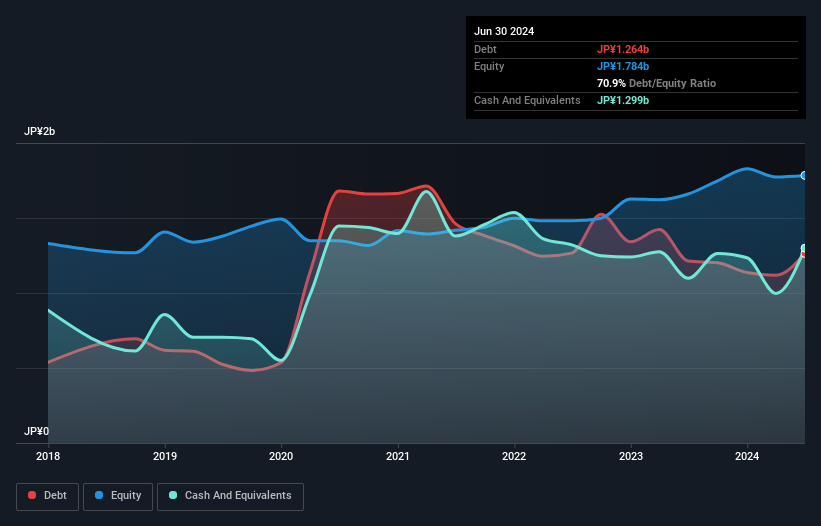
Legendary fund manager Li Lu (who Charlie Munger backed) once said, 'The biggest investment risk is not the volatility of prices, but whether you will suffer a permanent loss of capital.' So it seems the smart money knows that debt - which is usually involved in bankruptcies - is a very important factor, when you assess how risky a company is. We note that Yasue Corporation (TSE:1439) does have debt on its balance sheet. But the real question is whether this debt is making the company risky.
When Is Debt Dangerous?
Debt assists a business until the business has trouble paying it off, either with new capital or with free cash flow. Ultimately, if the company can't fulfill its legal obligations to repay debt, shareholders could walk away with nothing. However, a more usual (but still expensive) situation is where a company must dilute shareholders at a cheap share price simply to get debt under control. Of course, debt can be an important tool in businesses, particularly capital heavy businesses. The first thing to do when considering how much debt a business uses is to look at its cash and debt together.
Check out our latest analysis for Yasue
What Is Yasue's Debt?
The image below, which you can click on for greater detail, shows that at June 2024 Yasue had debt of JP¥1.26b, up from JP¥1.21b in one year. However, it does have JP¥1.30b in cash offsetting this, leading to net cash of JP¥35.0m.

How Healthy Is Yasue's Balance Sheet?
We can see from the most recent balance sheet that Yasue had liabilities of JP¥1.94b falling due within a year, and liabilities of JP¥674.0m due beyond that. Offsetting this, it had JP¥1.30b in cash and JP¥281.0m in receivables that were due within 12 months. So it has liabilities totalling JP¥1.04b more than its cash and near-term receivables, combined.
While this might seem like a lot, it is not so bad since Yasue has a market capitalization of JP¥2.53b, and so it could probably strengthen its balance sheet by raising capital if it needed to. But it's clear that we should definitely closely examine whether it can manage its debt without dilution. Despite its noteworthy liabilities, Yasue boasts net cash, so it's fair to say it does not have a heavy debt load!
On the other hand, Yasue's EBIT dived 11%, over the last year. If that rate of decline in earnings continues, the company could find itself in a tight spot. There's no doubt that we learn most about debt from the balance sheet. But it is Yasue's earnings that will influence how the balance sheet holds up in the future. So if you're keen to discover more about its earnings, it might be worth checking out this graph of its long term earnings trend.
But our final consideration is also important, because a company cannot pay debt with paper profits; it needs cold hard cash. While Yasue has net cash on its balance sheet, it's still worth taking a look at its ability to convert earnings before interest and tax (EBIT) to free cash flow, to help us understand how quickly it is building (or eroding) that cash balance. In the last three years, Yasue's free cash flow amounted to 33% of its EBIT, less than we'd expect. That's not great, when it comes to paying down debt.
Summing Up
While Yasue does have more liabilities than liquid assets, it also has net cash of JP¥35.0m. So we are not troubled with Yasue's debt use. There's no doubt that we learn most about debt from the balance sheet. But ultimately, every company can contain risks that exist outside of the balance sheet. We've identified 3 warning signs with Yasue (at least 1 which is significant) , and understanding them should be part of your investment process.
Of course, if you're the type of investor who prefers buying stocks without the burden of debt, then don't hesitate to discover our exclusive list of net cash growth stocks, today.
New: Manage All Your Stock Portfolios in One Place
We've created the ultimate portfolio companion for stock investors, and it's free.
• Connect an unlimited number of Portfolios and see your total in one currency
• Be alerted to new Warning Signs or Risks via email or mobile
• Track the Fair Value of your stocks
Have feedback on this article? Concerned about the content? Get in touch with us directly. Alternatively, email editorial-team (at) simplywallst.com.
This article by Simply Wall St is general in nature. We provide commentary based on historical data and analyst forecasts only using an unbiased methodology and our articles are not intended to be financial advice. It does not constitute a recommendation to buy or sell any stock, and does not take account of your objectives, or your financial situation. We aim to bring you long-term focused analysis driven by fundamental data. Note that our analysis may not factor in the latest price-sensitive company announcements or qualitative material. Simply Wall St has no position in any stocks mentioned.
About TSE:1439
Excellent balance sheet second-rate dividend payer.
Market Insights
Community Narratives



